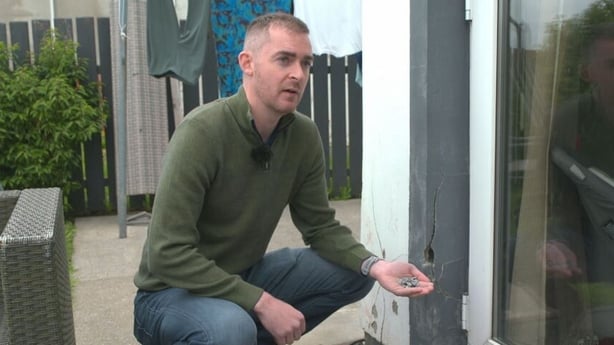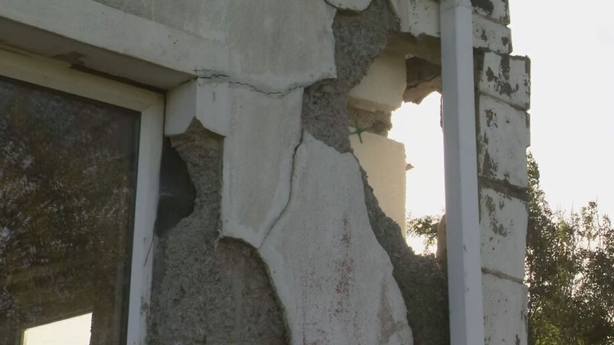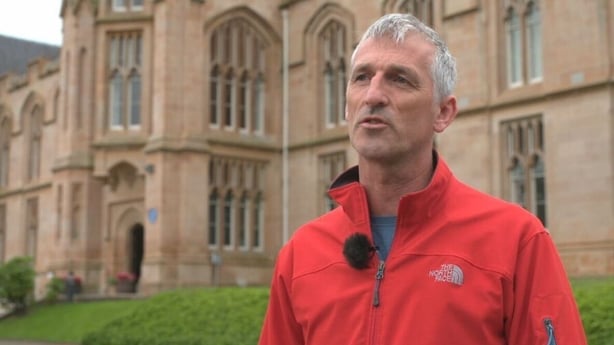Homeowners in the Defective Concrete Block Grant Scheme in Co Donegal who have their engineer's recommendation of full demolition downgraded to partial remediation have expressed frustration with the scheme.
The law firm Coleman Legal has confirmed to RTÉ News that 85 clients who are in the Government’s defective block redress scheme have had their engineer’s recommendations "downgraded" by the Housing Agency.
A further 35 homeowners have contacted Coleman Legal because they have been told they do not meet the damage threshold, or they shortly expect a "downgrade" by the Housing Agency.
Joe McBride, a homeowner whose chartered engineer recommended full demolition, was issued with a lesser option of remediation and has expressed his frustration with the decision.
Mr McBride said he was "frustrated" that the Housing Agency "is trying to force them to accept living in a house that is structurally unsound" and at "a high risk of internal deterioration as demonstrated in an engineer’s report".

He added that laboratory results carried out on concrete samples from his home showed "a significant pyrrhotite and Mica composition above the legal threshold in his internal and external walls".
A spokesperson for the Housing Agency said that in some instances "the remediation options differ to that of a homeowner’s engineer" and "that can be expected where a range of remediation options exist under IS 465 [standardised testing protocol for defective concrete blocks]".
They added that "it should be noted the Housing Agency engaged Chartered Engineers who have issued appropriate remediation option determinations for full demolition where the homeowner’s engineer has recommended lesser options of remediation".
The Minister for Housing, Local Government and Heritage has established a statutory independent appeals panel via the Public Appointments Service, made up of an independent group of industry experts to assess the appeals.
Membership of the appeals panel is made up of an independent group of industry experts spread across the country, including members based in three of the currently designated counties of Donegal, Mayo and Clare.

The Chairperson of the Mica Action Group in Donegal Lisa Hone said there is "no scientific evidence to show that a partial remediation will work when defective unregulated concrete is left in a home".
A review is underway on the standardised protocol used as part of the Defective Concrete Block Grant Scheme to assess homes suspected of being affected by defective concrete.
The National Standards Authority of Ireland (NSAI) is conducting the review of the protocol knows as IS 465:2018 following a Government decision in November 2021.
A spokesperson for the Department of Housing said the NSAI are aiming to publish a public consultation draft amendment to the defective block testing protocol in early Autumn.
It is understood that the NSAI is working on interim guidance to enhance the sampling and testing protocols for homes suspected of being affected by defective concrete.
An interagency Technical Matters Steering Group has been established to inform and guide the review of IS 465:2018 and the impact on foundations and the effect of full cavity fill insulation on homes susceptible to defective blockwork.
An international research consortium funded by Geological Survey of Ireland and the Department of Housing has worked closely with the NSAI technical committee to conduct scientific investigations into the causes of concrete failure in defective concrete from Donegal.

Professor Paul Dunlop of Ulster University, who heads the research consortium, said that it "has been widely acknowledged by Engineers Ireland and engineers working on the scheme that the current IS 465:2018 standard is not fit for purpose".
The final handover of the consortium’s results will take place later this month with most of the results already submitted to the NSAI, the Geological Survey Ireland and the Department of Housing.
Prof Dunlop says that IS 465:2018 "currently does not take the risk of internal sulfate attack into consideration but assesses the risk of Donegal homes to their exposure to freeze-thaw conditions based on the mica content in the blocks".
Prof Dunlop said his research team found that the primary cause of concrete failure in Donegal is due to an "iron sulfide mineral called pyrrhotite that is present in the aggregates that were quarried and used to make concrete in Donegal".

He said: "All of our analysis has shown that the pyrrhotite is oxidising and releasing sulfur, which is really problematic because this turns into sulfuric acid which then goes on to destroy the concrete by a process called internal sulfate attack.
"This is now widely accepted by the various science teams who are investigating this issue that internal sulphate attack, as a result of excessive pyrrhotite is the primary cause of the most serious damage seen within the affected properties across Donegal.
"Even though the revisions to IS 465 are ongoing, I would have thought at this stage that there is enough evidence for the Government to issue interim guidance to the Housing Agency so that engineering consultants employed to review applications to the defective block scheme are correctly assessing the risk internal sulfate attack poses to these homes."
The Department of Housing’s spokesperson said that Minister Darragh O’Brien is aware of correspondence and calls from local authority representatives and homeowners affected by defective concrete blocks.
The spokesperson added that "following the publication of any revised standard published by the NSAI, the enhanced DCB scheme will be reviewed and any amendments that may be required will be considered at that point".
The defective concrete block grant scheme currently has around 2,200 applications at various stages of the process; 418 applicants in the scheme have commenced work and 54 applicants have completed works.
We need your consent to load this rte-player contentWe use rte-player to manage extra content that can set cookies on your device and collect data about your activity. Please review their details and accept them to load the content.Manage Preferences







